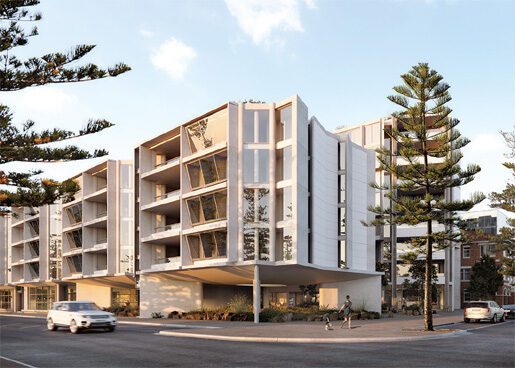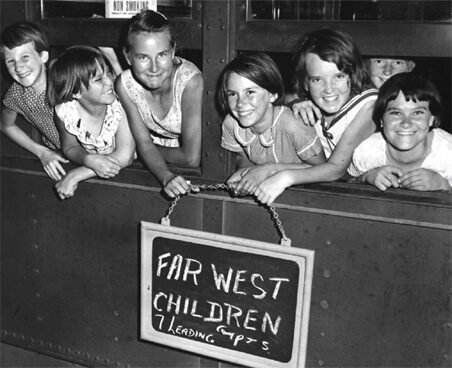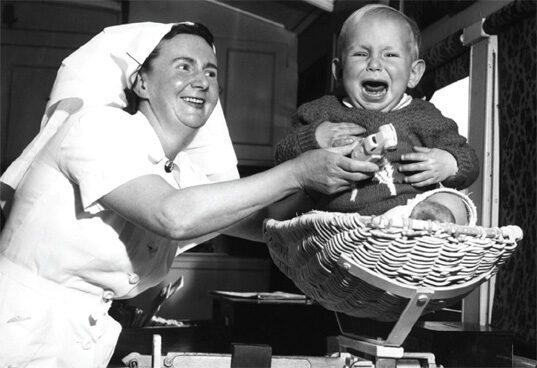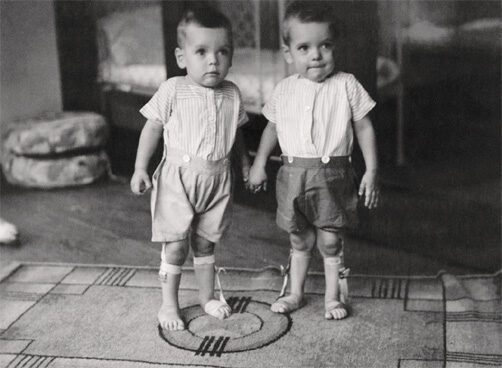Manly’s historic Royal Far West holds a special place in the hearts of many as it supports the health of children from rural and remote communities
Fran Southgate was a young child when she left her family and home in country NSW to seek medical treatment at Royal Far West (RFW) in Manly in the 1960s. “I was a farm girl,” the 64-year-old recalls. “I went down (to Manly) the first time when I was five and stayed for quite a long time. So much so that when I returned home, my parents were told that I had to repeat kindergarten.
“I would be picked up in (country town) Grenfell by what we call sisters (nurses) and they would accompany me on the train.” It was an overnight trip from Fran’s home near Cowra to Manly.
Fran recalls the loneliness she felt being away from her family for long stretches of time. By the time she was 12, Fran had visited the centre five times throughout her childhood, undergoing three surgeries at Manly Hospital to correct an upturned eye.
“Our parents did what they knew they had to at the time,” Fran says. “My folks could never have afforded the surgeries that I needed.”
Founded in 1924 by Methodist Reverend Stanley Drummond, the RFW charity had a mission which still holds firm today: to improve the health and well-being of children who live in rural and remote communities. Stanley was recuperating from a procedure, sitting on Manly Beach with his wife Lucy, when he first had the idea to bring children from places like Cobar in far-west NSW, where he lived, to Manly, so they too could enjoy the restorative qualities of the beach.
Rev Drummond took 58 children to attend the Far West seaside camp a year later for respite, and Manly’s own George Moncrieff Barron, a doctor, came on board in 1926 to offer his medical services free of charge to visiting country children.
Fran has fond memories of staying with the other country children at RFW’s Drummond House, close to Manly’s beachfront. When she wasn’t recovering from surgery, she was enjoying life by the sea. “We’d do school and we went for outings,” she remembers. “And I remember going to some really snazzy fireworks one time – I think that’s where my love of fireworks comes from.”
Regular afternoon walks to Shelly Beach, the sound of the ocean at night, the clanging of cutlery in the food hall, and fish served every Friday are memories which have stayed with Fran – especially as she reflects on the 100-year anniversary of RFW.

Plans for the new RFW Neighbourhood development
Fran is one of thousands of ‘Royal Far Westers,’ adults who, at one point in their childhood, received medical treatment through RFW. Some of them keep in touch via Facebook groups, and celebrations for the anniversary have seen memories flood back.
Fran even made the trip from her home in Western Sydney with a fellow Royal Far Wester to visit an exhibition of photos, hosted by Manly MP James Griffin at NSW Parliament in March, showing the evolution of RWF over the past century, from children receiving treatment for polio, to Rail Clinic Cars, train carriages serving as mobile baby health clinics in country NSW.
Jacqui Emery, RFW chief executive officer says the charity has adapted to meet the changing needs of children in remote and rural communities. They offer health, education and disability services in Manly and virtually via Telecare. They also work in over 360 rural and remote communities.

Campers arrive at Central Station by train for a RFW camp, c1965
And patients, their parents and siblings now come to stay at the Centre for Country Kids in Manly together for a week at a time. “They come here and they get a wonderful service, not only clinically, but a holistic wraparound service for the family,” Jacqui says, explaining that as well as seeing all the necessary doctors and clinicians, the patient and their family can go to Manly Beach and spend time connecting as a family. The patient and their siblings also attend the Royal Far West School, first established in 1938, while visiting to keep up with their lessons.
“It’s often a completely life-changing week,” Jacqui says. This is a benevolent service, which means that parents don’t have to pay anything for the stay, or for the clinicians the child receives during their time in Manly. “It’s where our fundraising goes,” Jacqui says, explaining that while they do get a grant from the NSW Government to help provide the service, RFW needs to top that up by at least $2 million per year in a co- contribution model.

Sister Dirnan in rail car clinic, c1950s
Jacqui explains that in the last 25 years, children’s developmental health has become a priority. They now help children with mental health issues, anxiety, depression and other conduct disorders. And despite the charity increasing their services, there is a growing demand. “We have expended all of our funds in the last 10 years to grow our numbers from (providing one-on-one) support to 700 children and families a year 15 years ago, to supporting over 4,000 children and families last year,” she says. In some rural towns, the wait to see a paediatrician can be six years, Jacqui adds.
This is why fundraising events, like the annual Ride for Country Kids, is so important. A record number of 94 cyclists will take part in the historic ride this year from Bourke through to Cobar, ending in Narromine, from 15 to 17 May. It’s hoped that this year’s ride will raise $750,000.
MP James Griffin says that everyone in Manly can be proud of RFW. “When I was travelling the far-west of NSW during my role as Minister for the Environment (in the previous Liberal Government), the moment I told people I represented Manly in parliament, they all knew about RFW.

Twins Ken and Kevin after 16 months of treatment for turned feet, 1937
“In the tiniest of towns, hours from anywhere, people would tell me about their family member or friend who had used the services of the RFW. It was at that time that it really dawned on me how important RFW was and how very proud we should be to have it located in Manly,” Mr Griffin says.
RFW patron, Governor-General Sam Mostyn AC agrees that 100 years of service to country children and their families is an accomplishment. “Education and healthcare are essential for children to flourish, and it is inspiring to see RFW’s enduring impact over many years in helping country kids to reach their full potential,” Her Excellency tells Peninsula Living.
Looking to the future, construction is underway for a RFW Neighbourhood, with the development comprising of waterfront apartments, revitalised accommodation for country families and a blend of retail, commercial and lifestyle-related spaces.
“It’s been the most incredible organisation to work for with the richest history imaginable,” Jacqui says. “It’s very much a privilege and an honour to be here as chief executive officer at this point in time in our 100 years here.”








